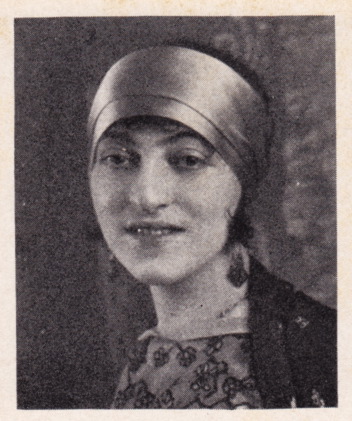Candles of Song 1 of 2
October 18, 2012 by Sheva Zucker
Candles of Song: Malka Lee
Yiddish poems about mothers, in memory of my mother, Miriam Pearlman Zucker, 1914-2012.

Photo of Malka Lee
Malka Lee (1904-1976) (pseudonym of Malka Leopold-Rappaport) was born in Monastrikh, Eastern Galicia into a Hasidic home. During the World War I she and her family fled to Hungary and then to Vienna where they lived until 1918. She studied in a Polish elementary and high school. She began writing poetry in German but in 1921, the year she emigrated to New York, she turned to Yiddish. In 1922 she made her literary debut in Di feder, NY, and after that she contributed poems, stories and memoirs to many newspapers and magazines including: Fraye arbeter shtime, Frayheyt, Tsukunft, Tog-morgn-zhurnal, Idishe kemfer, Di goldene keyt and Kinder-zhurnal.
She and her first husband, the Yiddish writer Aaron Rappaport, owned and operated a bungalow colony in High Falls, New York which became a haven for Yiddish intellectuals based in New York. According to Jewish Women in America: An Historical Encyclopedia, Lee’s work “is representative of an entire generation of Jewish women born and educated in Eastern Europe at the beginning of the twentieth century who found a very different life in America. Her early poetry intertwines the memories of shtetl life in a Hasidic family with the realities of the secular immigrant experience. Her volumes published between 1945 and 1950 reflect the personal pain of observing the Holocaust, with its destruction of family and childhood home, from the safety of distance in America. Her later work expresses a love of nature and attachment to America, as well as her Zionist devotion to the State of Israel.”
Lee published 6 volumes of poetry: Lider (Poems), 1932, Gezangen (Songs), 1940, Kines fun undzer tsayt (Lamentations of our times), 1945, Durkh loytere kvaln (Through pure springs), 1950, In likht fun doyres (In the light of generations), 1961, Untern nusnboym (Under the nut tree), 1969 as well as her memoirs Durkh kindershe oygn (Through childish eyes), 1955 and a children’s book Mayselekh far Yoselen (Stories for Yosele), 1969.
Here, Mayn Mamen, by Malka Lee, read by Sheva Zucker:
To My Mother
I spin a string of jewels for you
Of all my days and years.
My mother, I am mirrored in you
Like sun in a clear spring.
When my daughter prepares for her journey
Your image stands before her.
I gather in your words
Like sheaves of golden stalks.
Your every word is implanted in me,
The ripening years deepened my perceptions.
That which I did not complete
I wove into my children.
Your goodness, the beauty of your being,
Flowed through my veins –
And so, as with good claret,
I decanted it into golden goblets.
Translated by Ana Berman and Bella Sanderson on the occasion of their mother’s funeral.
Mayn Mamen
Ikh shpin oys a tsirungshnur far dir,
Fun ale mayne teg un yorn.
Mame mayne, ikh shpigl zikh in dir,
Vi zun in a kval a klorn.
Ven mayn tokhter in veg zikh greyt,
Shteyt dayn ponem ir tsukopns.
Ikh zaml ayn dayne reyd,
Vi zangen goldene in snopes.
Dayn yedes vort in mir farflantst,
Durkh yorn rayfe, tifer zey banumen.
Dos vos ikh hob nisht dergantst –
In mayne kinder arayngeshpunen.
Dayn gutskeyt, dayn sheynkeyt fun dayn zayn,
In mayne odern geflosn –
Hob ikh, vi gutn roytn vayn,
In keylim goldene ibergegosn.
In likht fun doyres, 1961
מײַן מאַמען
איך שפּין אױס אַ צירונגשנור פֿאַר דיר,
פֿון אַלע מײַנע טעג און יאָרן.
מאַמע מײַנע, איך שפּיגל זיך אין דיר,
װי זון אין אַ קװאַל אַ קלאָרן.
װען מײַן טאָכטער אין װעג זיך גרײט,
שטײט דײַן פּנים איר צוקאָפּנס.
איך זאַמל אײַן דײַנע רײד,
װי זאַנגען גאָלדענע אין סנאָפּעס.
דײַן יעדעס װאָרט אין מיר פֿאַרפֿלאַנצט,
דורך יאָרן רײַפֿע, טיפֿער זײ באַנומען.
דאָס װאָס איך האָב נישט דערגאַנצט —
אין מײַנע קינדער אַרײַנגעשפּונען.
דײַן גוטסקײט, דײַן שײנקײט פֿון דײַן זײַן,
אין מײַנע אָדערן געפֿלאָסן —
האָב איך, װי גוטן רױטן װײַן,
אין כּלים גאָלדענע איבערגעגאָסן.
אין ליכט פֿון דורות, 1961
Poems cross-posted with ShevaZucker.com.
Dr. Sheva Zucker is currently the Executive Director of the League for Yiddish and the editor of its magazine Afn Shvel. She has taught and lectured on Yiddish language, literature and culture on five continents.
 Please wait...
Please wait...